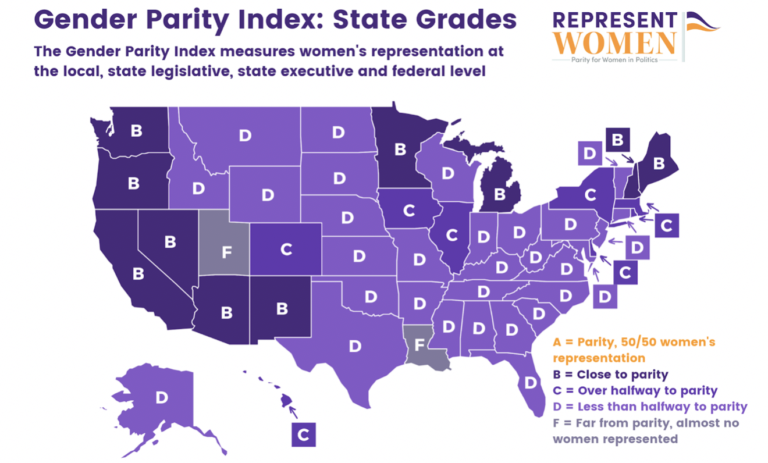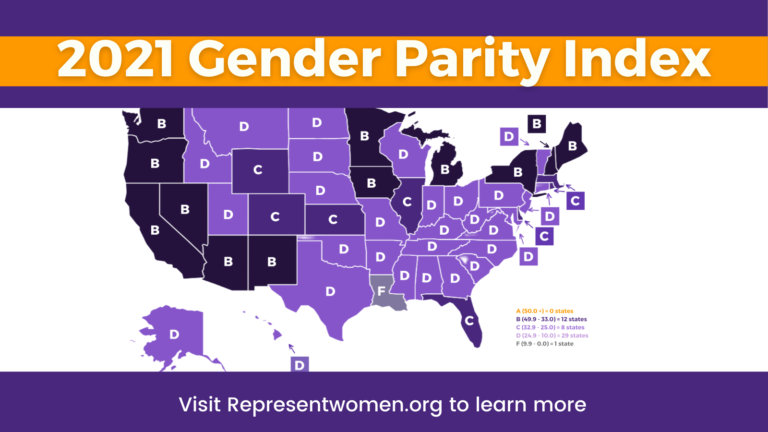For many, the 2018 elections and the election of the 116th Congress felt like…
The 2025 Gender Parity Index: Progress Made, But Half of States Still Lag Behind

Twelve years after its launch, RepresentWomen’s Gender Parity Index (GPI) remains one of the clearest measures of how women are represented in American politics. The annual report assigns each state a score and letter grade based on the number of women serving in local, state, and federal office — essentially, a political “report card” for gender balance in governance.
The 2025 edition offers both reason for celebration and cause for concern. For the first time, three states — New Hampshire, Oregon, and Maine — earned an “A” grade. Each surpassed the benchmark of gender parity (a score of 50 out of 100), placing women in key roles across multiple levels of government. Their success underscores what is possible when electoral conditions support women’s candidacies.
But beyond those bright spots, the picture is sobering. Half the country — 25 states — earned a “D” grade, concentrated mainly in the South. The national average score is just 27.7, a reminder that the United States is still only halfway to gender parity.
Even high-achieving states have struggled to maintain momentum. New Hampshire, which reclaimed the top spot this year with a score of 53.9, had fallen to 11th place just a year earlier. This volatility reveals a central truth of the GPI: progress toward gender balance in politics is fragile. Without structural reforms to sustain women’s leadership, gains can quickly disappear.
The uneven results of the 2025 Index reflect a larger reality. As of this year, women make up just 28 percent of Congress, 24 percent of governors, 34 percent of state legislators, and 25 percent of mayors in major cities. Within those numbers, disparities are even sharper: Republican women are outnumbered by Democratic women nearly two to one in most legislative bodies, women of color remain significantly less likely to be elected, and young women are dramatically underrepresented at every level. These gaps show that progress has been uneven not only across states, but across party lines, racial identities, and generations.
Globally, the United States ranks 78th in the world for women in national legislatures, trailing nearly all of its OECD peers. The Council on Foreign Relations’ Women’s Power Index, created by Linda Robinson, offers another revealing measure: the U.S. ranks 60th worldwide, with a score of just 36 out of 100 — a failing grade that reflects the limited power women actually hold relative to their share of the population.
As RepresentWomen’s Executive Director Cynthia Richie Terrell wrote in a recent Ms. Magazine article, “This is not a matter of symbolism. It is a crisis for democracy.” Research shows that when women serve, legislatures become more collaborative, more responsive, and more focused on the everyday issues that matter most to families and communities. Without women, decision-making is narrower, less inclusive, and more vulnerable to the authoritarian currents reshaping politics today. A system that sidelines half the population cannot credibly call itself a representative democracy.
At RepresentWomen, we recognize that candidate-focused efforts alone are insufficient. Preparing individual women to run for office matters, but without systems designed to level the playing field, the pace of change will remain slow. To remedy this, we support reforms such as ranked choice voting, proportional representation — which has helped countries like Australia elect more women to office — and modernized legislative practices that make it possible for more women to serve and lead.
The Gender Parity Index was first unveiled at a 2013 panel at New York University moderated by Cynthia Richie Terrell. Twelve years later, the questions raised then — why women remain underrepresented in politics, and what can be done to change it — are as relevant as ever.
As the 2025 report makes clear, women’s political power in the United States has advanced in fits and starts. There are reasons to celebrate, but also urgent reasons to act. If parity is to be achieved within our lifetimes, progress must become not only more consistent but more permanent.






